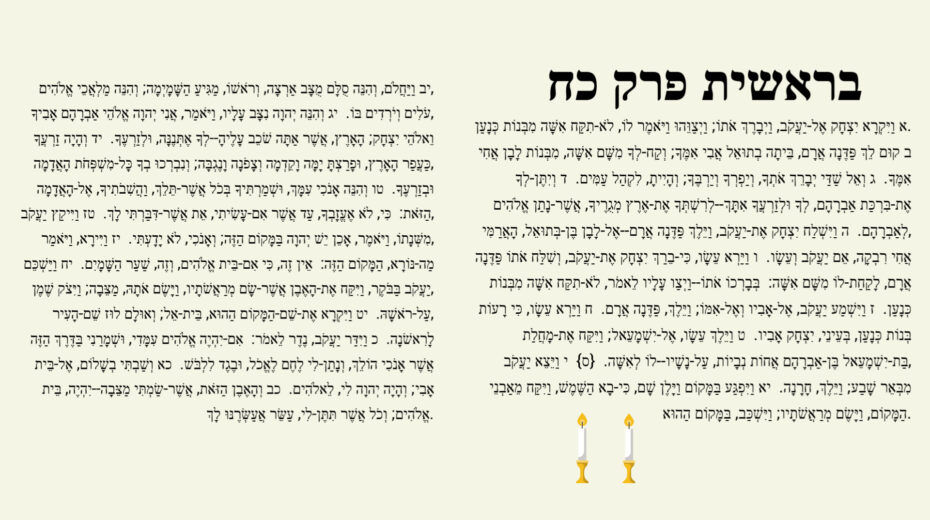Weekly Torah Reading – וַיֵּצֵ֥א – Vayetze – He Went Out; Genesis 28:10 – 32:3; Hosea 12:13 – 14:10
Moses takes leave of his people. The time is ripe. It is the story of a leader parting from his people, a people that has gained freedom and now stands on the threshold of a new era. Moses’ words are timeless. They call us to be strong and courageous, not because the path is easy, but precisely because challenges, struggles, and difficulties are part of our lives. This reading invites us to pause, reflect, and find the strength to carry us through adversity, to believe in something greater than ourselves, and to remember that we are never alone.
This Torah portion, read between Rosh Hashanah and Yom Kippur, is the portion of farewell. In it, Moses concludes his speech found in the Book of Deuteronomy and bids farewell to his people, a people he took charge of over forty years earlier, a people he knew as slaves, who received the Torah at Sinai, and who almost entirely passed away during the forty years of wandering in the desert. Now, Moses stands before a generation that knows freedom and has known only one leader from birth—Moses himself. This people stands before a new chapter: they will receive a land and must part with the greatest spiritual leader they ever had.
Moses says: “I am one hundred and twenty years old today; I can no longer go out and come in, and the Eternal has told me that I will not cross this Jordan. But you will not be left alone: The Eternal, your God, will go before you. He will drive out these nations before you, and Joshua will go before you, as the Eternal has spoken. Be strong and courageous! Do not fear or be dismayed, for the Eternal, your God, is with you; He will not fail you or forsake you.”
“Be strong and courageous – חֲזַק וֶאֱמָץ,” with these words Moses addresses both the people and Joshua, their new leader. What does “strong and courageous” mean? Does it encourage bravery? Or is it about striving and resilience? Is strength achieved through effort? How does one become strong and courageous? Elsewhere in the Bible, in the Psalms (27), it says: “Hope in the Eternal! Be strong, and let your heart take courage! Hope in the Eternal!” The call is directed to the heart—to be strong and courageous, one must have a strong heart, not a weak, cowardly, hesitant heart.
“Strong and courageous” does not mean that things will never be difficult, that there will be no wars, or that victory is assured. It does not mean the path is predetermined or that one will not suffer defeats. It means the ability to endure difficulties, struggles, and defeats. For where fear and weakness prevail, one collapses. “Strong and courageous” means not allowing fear and weakness to control one’s life. A strong and courageous people endures, despite illness and hardships, despite terror attacks and traffic accidents, despite high housing prices, cruel acts of terror, wars, boycotts, hatred, and incitement worldwide.
A strong heart is a heart that does not break despite all adversities, a heart that recognizes that difficulties are temporary and that something greater awaits beyond them—God, who never lets go or abandons us. Sometimes it is hard to see God because He is hidden, and we perceive only the evil. Then we feel utterly alone, and the danger of breaking is great; we might forget that God is there. Therefore, the most important duty is the duty of remembrance: “That they may hear and learn to fear the Eternal, your God, and observe all the words of this Torah.” We are to remember God, who is with us even in difficult times, the Torah we received from Him, and that we have a role to fulfill in this world.
This Torah portion is read after Rosh Hashanah, the Day of Remembrance, when our deeds are recalled and evaluated. During the Ten Days of Repentance, we are invited to reflect on where we have sinned, where we have caused harm to ourselves and others, and where we must learn. And in these days, as we contemplate our mistakes, we should always remember: “The Eternal, your God, goes with you; He will not fail you or forsake you.”
There is grace, mercy, and One who walks with us, never letting go—the King of the world and the universe, the almighty God. This is Moses’ legacy to his people, his final words. We are invited to take them to heart, draw strength from them, pray, plead, and above all, seek God’s forgiveness: “Forgive us, have mercy on us, atone for our sins.”
Shabbat Shalom.
Shabbat Times in Israel (Local Time):
- Jerusalem – Start: 5:55 PM, End: 7:05 PM
- Tel Aviv – Start: 6:10 PM, End: 7:07 PM
- Haifa – Start: 6:01 PM, End: 7:06 PM
- Beersheva – Start: 6:12 PM, End: 7:07 PM
- Eilat – Start: 6:01 PM, End: 7:06 PM













